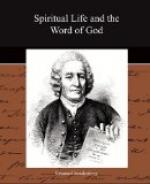As the Divine truth united to Divine good goes forth from the Lord as a sun, and by this heaven and the world were made (John i. 1, 3, 10), it follows that it is from this that all things in heaven and in the world have reference to good and to truth and to their conjunction in bringing forth something. These ten commandments contain all things of Divine good and all things of Divine truth, and there is also in them a conjunction of these. But this conjunction is hidden; for it is like the conjunction of love to the Lord and love toward the neighbor, Divine good belonging to love to the Lord, and Divine truth to love toward the neighbor; for when a man lives according to Divine truth, that is, loves his neighbor, the Lord flows in with Divine good and conjoins Himself. For this reason there were two tables on which these ten commandments were written, and they were called a covenant, which signifies conjunction; and afterward they were placed in the ark, not one beside the other, but one above the other, for a testimony of the conjunction between the Lord and man. Upon one table the commandments of love to the Lord were written, and upon the other table the commandments of love toward the neighbor. The commandments of love to the Lord are the first three, and the commandments of love toward the neighbor are the last six; and the fourth commandment, which is “Honor thy father and thy mother,” is the mediating commandment, for in it “father” means the Father in the heavens, and “mother” means the church, which is the neighbor. (A.E., n. 1026.)
Something shall now be said about how conjunction is effected by means of the commandments of the Decalogue. Man does not conjoin himself to the Lord, but the Lord alone conjoins man to Himself, and this He does by man’s knowing, understanding, willing, and doing these commandments; and when man does them there is conjunction, but if he does not do them he ceases to will them, and when he ceases to will them he ceases also to understand and know them. For what does willing amount to if man when he is able does not do? Is it not a figment of reason? From this it follows that conjunction is effected when a man does the commandments of the Decalogue.
But it has been said that man does not conjoin himself to the Lord, but that the Lord alone conjoins man to Himself, and that conjunction is effected by doing; and from this it follows that it is the Lord in man that does these commandments. But anyone can see that a covenant cannot be entered into and conjunction be effected by it unless there is some return on man’s part, not only in consent but also in acceptance. To this end the Lord has imparted to man a freedom to will and act as if of himself, and such a freedom that man does not know otherwise, when he is thinking about truth and doing good, than that the freedom is in himself and thus from himself. There is this return on man’s part in order that conjunction may be effected. But as this freedom is from the Lord, and continually from Him, man must by all means acknowledge that thinking about and understanding truth and willing and doing good are not from himself, but are from the Lord.




